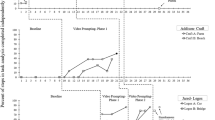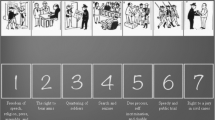Abstract
This investigation (a multiple probe design across behaviors) analyzed the effectiveness of a constant time delay procedure in teaching leisure skills to adolescents with severe or profound developmental disabilities. Data collected on specific dependent variables indicated increases in participants' approaches toward available leisure materials, choices made, appropriate use of leisure materials, and duration of sustained attention to leisure activities as they acquired leisure skills. Concurrently, classroom personnel offered their students an increasing number of opportunities to engage in self-determined behavior and in leisure activities. Results of the study are discussed in terms of designing instructional programs for individuals with severe or profound developmental disabilities that enhance both the learners' leisure skills and self-determined behavior.
Similar content being viewed by others
REFERENCES
Bedini, L. A., Bullock, C. C., and Driscoll, L. B. (1993). The effects of leisure education on factors contributing to the successful transition of students with mental retardation from school to adult life. Ther. Rec. J. 27: 70–82.
Bellamy, G. T., Horner, R., and Inman, T. (1979). Vocational Habilitation of Severely Retarded Adults, University Press, Baltimore.
Billingsley, F. F., White, O. R., and Munson, R. (1980). Procedural reliability: A rationale and an example. Behav. Assess. 2: 229–241.
Bolton, J. L., Belfiore, P. J., Lalli, J. S., and Skinner, C. H. (1994). The effects of stimulus modification on putting accuracy for adults with severe or profound mental retardation. Ed. Train. Ment. Retard. Devel. Dis. 29: 236–242.
Brown, F., Belz, P., Corsi, C., and Wenig, B. (1993). Choice diversity for people with severe disabilities. Ed. Train. Ment. Retard. 28: 318–326.
Certo, N. J., Schleien, S. J., and Hunter, D. (1983). An ecological assessment inventory to facilitate community recreation participation by severely disabled individuals. Ther. Rec. J. 17: 29–38.
Collins, B. C., Branson, T. A., and Hall, M. (1995). Teaching generalized reading of cooking product labels to adolescents with mental disabilities through the use of key words taught by peer tutors. Ed. Train. Ment. Retard. Devel. Dis. 30: 65–75.
Collins, B. C., and Stinson, D. M. (1995). Teaching generalized reading of product warning labels to adolescents with mental disabilities through the use of key words. Exceptionality 5: 163–181.
Csikszentmihalyi, M., Larson, R., and Prescott, S. (1977). The ecology of adolescent activity and experience. J. Youth Adol. 6: 281–294.
Dattilo, J., and Kleiber, D. A. (1993). Psychological perspectives for therapeutic recreation research. In Malkin, M. J., and Howe, C. Z. (eds.), Research in Therapeutic Recreation: Basic Concepts and Methods, State College, PA., Venture, pp. 57–73.
Dattilo, J., and Murphy, W. D. (1991). Leisure Education Program Planning: A Systematic Approach, Venture, State College, PA.
Ellis, D. N., Cress, P. J., and Spellman, C. R. (1993). Training students with mental retardation to self-pace while exercising. Adapt. Phys. Act. Quart. 10: 104–124.
Gothelf, C. R., Crimmons, D. B., Mercer, C. A., and Finocchiaro, P. A. (1994). Teaching choice-making skills to students who are deaf-blind. Teach. Except. Child. 26: 13–15.
Hall, G. M., Schuster, J. W., Wolery, M., Gast, and Doyle, P. M. (1992). Teaching chained skills in a non-school setting using a divided half instructional format. J. Behav. Ed. 2: 257–279.
Hamre-Nietupski, S., Nietupski, J., Sandvig, R., Sandvig, M. B., and Ayres, B. (1984). Leisure skills instruction in a community residential setting with young adults who are deaf/blind severely handicapped. J. Assoc. Pers. Sev. Handicaps 9: 49–53.
Heyne, L. A., Schleien, S. J., and McEvoy, L. H. (1993). Making Friends: Using Recreation Activities to Promote Friendship Between Children With and Without Disabilities., Institute on Community Integration (University Affiliated Program), Minneapolis, MN.
Horner, R. D., and Baer, D. M. (1978). Multiple probe technique: A variation of the multiple baseline. J. Appl. Behav. Anal. 11: 189–196.
Iso-Ahola, S. E. (1983). Social psychological foundations of leisure and resultant implications for leisure counseling. In Dowd, T. E. (ed.), Leisure Counseling: Concepts and Applications, Charles C Thomas, Springfield, IL, pp. 97–125.
Jeffree, D. M., and Cheseldine, S. E. (1984). Programmed leisure intervention and the interaction patterns of severely mentally retarded adolescents: A pilot study. Am. J. Ment. Defi. 88: 619–624.
King, D., and Mace, F. C. (1990). Acquisition and maintenance of exercise skills under normalized conditions by adults with moderate and severe mental retardation. Ment. Retard. 28: 311–317.
Sandkop, P. A., Schuster, J. W., Wolery, M., and Cross, D. P. (1992). The use of an adaptive device to teach students with moderate mental retardation to select lower priced grocery items. Ed. Train. Ment. Retard. 27: 219–229.
Sigafoos, J., Laurie, S., and Pennell, D. (1995). Preliminary assessment of choice making among children with Rett syndrome. J. Assoc. Pers. Sev. Handicaps 20: 175–184.
Silliman, L. M., and French, R. (1993). Use of selected reinforcers to improve the ball kicking of youths with profound mental retardation. Adapt. Phys. Act. Quart. 10: 52–69.
Snell, M. E. (1982). Analysis of time delay procedures in teaching daily living skills to retarded adults. Anal. Intervent. Devel. Dis. 2: 139–155.
Swann, W. B., and Pittman, T. S. (1977). Imitating play activity of children: The moderating influence of verbal cues on intrinsic motivation. Child Devel. 48: 1128–1132.
Tawney, J., and Gast, D. L. (1984). Single Subject Research in Special Education., Merrill, Columbus, OH.
Taylor, J. C., McKelvey, J. L., and Sisson, L. A. (1993). Community-referenced leisure skill clusters for adolescents with multiple disabilities. J. Behav. Ed. 3: 363–386.
Vandercook, T. (1991). Leisure instruction outcomes: Criterion performance, positive interactions, and acceptance by typical high school peers. J. Sp. Ed. 25(3): 320–339.
Wall, M. E., and Dattilo, J. (1995). Creating option-rich learning environments: Facilitating self-determination. J. Sp. Ed. 29: 276–294.
Williams, R. (1991). Choices, communication, and control—a call for expanding them in the lives of people with severe disabilities. In Meyer, L. H., Peck, C. A., and Brown, L. (eds.), Critical Issues in the Lives of People with Severe Disabilities, Brookes, Baltimore, pp. 543–544.
Winterling, V., Gast, D. L., Wolery, M., and Farmer, J. A. (1992). Teaching safety skills to high school students with moderate disabilities. J. Appl. Behav. Anal. 25: 217–227.
Zhang, J., Gast, D. L., Horvat, M., and Dattilo, J. (1995). The effectiveness of a constant time delay procedure on teaching lifetime sport skills to adolescents with severe to profound intellectual disabilities. Ed. Train. Ment. Retard. Devel. Dis. 30: 51–64.
Author information
Authors and Affiliations
Rights and permissions
About this article
Cite this article
Wall, M.E., Gast, D.L. & Royston, P.A. Leisure Skills Instruction for Adolescents with Severe or Profound Developmental Disabilities. Journal of Developmental and Physical Disabilities 11, 193–219 (1999). https://doi.org/10.1023/A:1021803331413
Issue Date:
DOI: https://doi.org/10.1023/A:1021803331413




